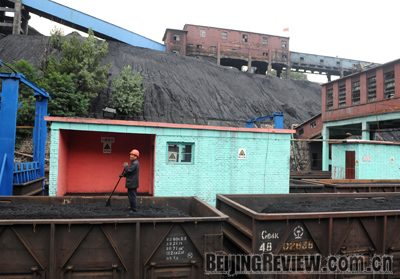| Numbers of the Week
$3 million
Venture capital institutions on the Chinese mainland raised more than $3 million in the second quarter of this year, a 70-percent increase year on year.
10 billion yuan
China plans to set up a fund of 10 billion yuan ($1.5 billion) to give financial support to coal bed methane and renewable energy projects in Shanxi Province.
|
TO THE POINT: The U.S. financial crisis swept across the world and shook the very foundations of the global financial system. Mainland stock markets plunged on the news of the U.S. financial catastrophe and dived to new lows. Some Chinese financial institutions disclosed that they held bonds issued by the U.S. investment bank Lehman Brothers, which declared bankruptcy. China accumulated more U.S. Treasury bonds in July after observing a U.S. dollar rebound. The domestic property market underwent a correction period after two years of housing price surges. Despite the global financial agony, China still remained attractive to foreign companies. The American conglomerate General Electric said it planned to set up five new regional headquarters in the country.
By LIU YUNYUN |
Fallout from Lehman Brothers' Collapse

The worsening U.S. financial crisis had spurred fears in Chinese financial institutions, some of which hold bonds issued by now bankrupt Lehman Brothers Holdings Inc.
The American investment bank's bonds have become hot potatoes. As of September 18, four major Chinese commercial banks disclosed their Lehman Brothers' bond holdings, among which the Industrial and Commercial Bank of China Ltd. (ICBC) held the largest amount of up to $151.8 million.
Lehman Brothers, the fourth largest investment bank in the United States, filed for bankruptcy protection on September 16, another victim of the U.S. subprime debacle, bringing an end to its 148 years of operation.
Right after Lehman Brothers filed for Chapter 11 bankruptcy, the Chinese financial institutions published notices on the Shanghai Stock Exchange to warn investors about potential risks. It is estimated that they could hold more than $400 million worth of the company's bonds.
But many analysts said the banks would not face huge losses from the bonds. Take ICBC for instance. In the first half of the year, the Chinese bank said its Lehman Brothers' bonds were worth $151.8 million. This amounted to 0.01 percent of ICBC's total assets, 0.03 percent of its overall bond investment value, and 1.6 percent of its profit in the first six months. During that time, ICBC posted net profit of 64.9 billion yuan ($9.5 billion), overtaking HSBC Holdings Plc as the most profitable bank in the world.
The ripple effect of the U.S. financial crisis could spread to China, and result in weaker import demand from the United States, which would drag down China's export growth.
Some experts say the negative impact of this round of the U.S. financial crisis was controllable, because most American industrial sectors remained unshaken. Li Yang, Director of the Institute of Finance and Banking under the Chinese Academy of Social Sciences, told China Securities Journal that the recent financial crisis only affected the securities, money management, and financial derivatives industries. He added that the traditional banking systems in both the United States and China have remained intact despite some subprime losses in both countries.
Stock Market Calamity
The U.S. financial crisis spread across the Pacific Ocean and hit Chinese stock market investors.
| 